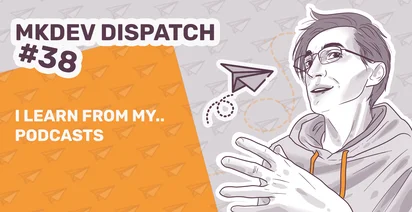I Learn From My.. Podcasts | ✉️ #38

Hey! 👋
You know, an interesting thing I've started to notice while we've been recording the DevOps Accents podcast episodes. How much I'm really learning for myself and how it's helping me understand the cloud technologies better and more deeply. For me, someone whose interests lie away from deeply technical things and more in the realm of creativity, this is very important. And I realized that the format of talking to people, about their experiences, the challenges they face, and the solutions they find, does a much better job of explaining both the nature of the technologies, the challenges they solve, and the roles that engineers try on. This works much better than opening an article and reading. Why? I'm not sure. Many people would probably say it's because different people absorb information differently. But I think it's also because when an author writes an article they have different goals. They needs to use keywords to make search engine optimization work better, use clever terms to impress potential customers, and as a result I get not knowledge, but consume a product.
During the podcast, on the other hand, I have the privilege of asking a really dumb question to an expert whose hourly rate is so high that it shouldn’t be wasted answering such questions. For that price, they should only be asked about things that will benefit the company in the next minute (otherwise, why would you hire such a highly qualified expert, right?). Nevertheless, I get my answer in a human format that is easy to digest and absorb. And that's where I think the value of podcasts lies. Don’t you agree? So listen to our podcasts, and subscribe, because you really learn a lot from it! And.. you know what? If you have a dumb question that you're embarrassed to ask (because it's not fit for an engineer), then send it to me! I'll ask them to our guests on my own behalf, I'm not shy :)
What We've Shared
On our Youtube channel we continue to learn to optimize our costs, both for AWS and GCP:
AWS Compute Savings Plans: Are They Right for You? If you're using AWS and looking to save money on your compute costs, you've probably heard about Savings Plans. But are they the right choice for your business? In this video, we'll explain everything you need to know about AWS Compute Savings Plans and help you decide if they are a good fit for your organization.
GCP FinOps Hub: The Key to Mastering Your Finances on Google Cloud. Managing your Google Cloud costs is crucial for any business and finances. In this tutorial, we’ll cover everything how to use GCP FinOps, cost management and how to setup Direct VPC egress to reduce Cloud Run costs. Learn how to optimize your spending and stay within your budget with our step-by-step guide.
DevOps Accents #30: Vision Pro changes the world, WeaveWorks vanishes. In this episode of DevOps Accents, Pablo, Leo, and Kirill discuss Twitter's changes, Apple's Vision Pro impact, VR's future role, and tech dependency.
And on the website our Argo CD Lightning Course continues as a series of articles.
Argo CD Installation and Architecture. In the first lesson of our Argo CD Lightning Course let's look at the installation process, as well as at some of the core components inside Argo CD.
Argo CD Clusters and Repositories - Two Core Components. In the second lesson of our Argo CD Lightning Course we are going to configure two core components inside Argo CD server - repositories and clusters.
What We've Discovered
Implementing (soft) data contracts for Terraform stacks. An interesting approach for sharing information between Terraform stacks. A bit enterprisy and can definitely overcomplicate things for a small to mid scale setups, but has a good potential for a truly large scale setup.
Open Source serverless Terraform Registry. An AWS-based implementation of Terraform Registry, to store all your private modules instead of just using Git.
Multiple Terraform projects in a mono-repo. How to survive a mess? A Docker Compose-inspired workflow and tooling for Terraform mono-repos. The aim is to simplify working with many different projects and environments within the single repository.
Reducing our AWS bill by $100,000. They reduced it by moving to on-prem.. Just kidding, they just optimized their AWS usage very well. Lots of good practical examples there!
Alerts Are Fundamentally Messy. A realistic take on alerts - they will always be messy and noisy and it's an always ongoing iterative process to make them less so.
A random reminder
Are you an avid Medium reader? You can follow mkdev on Medium and get our articles and videos there! Let us hear your claps :)
The 39th mkdev dispatch will arrive on Friday, March 1st. See you next time!
